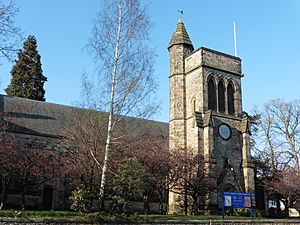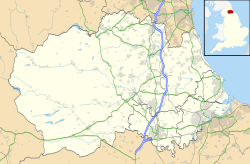Holy Trinity Church, Darlington facts for kids
Quick facts for kids Holy Trinity Church, Darlington |
|
|---|---|

Holy Trinity Church, Darlington
|
|
| 54°31′40.4″N 1°33′51″W / 54.527889°N 1.56417°W | |
| Location | Darlington |
| Country | England |
| Denomination | Church of England |
| Architecture | |
| Heritage designation | Grade II* listed |
| Architect(s) | Anthony Salvin |
| Groundbreaking | 4 October 1836 |
| Construction cost | £3,404 |
| Administration | |
| Parish | Holy Trinity Darlington |
| Deanery | Darlington |
| Archdeaconry | Auckland |
| Diocese | Diocese of Durham |
Holy Trinity Church in Darlington is a beautiful old church that belongs to the Church of England. It's located on Woodland Road in Darlington, a town in County Durham, England. This church is very special because it's listed as a Grade II* listed building, which means it's an important historical place.
History of the Church
This church was designed by a famous architect named Anthony Salvin. Building work started in 1836 and finished in 1838.
In 1843, Holy Trinity Church was given its own parish, which is like its own local area for church activities. At the same time, a special burial ground was blessed by the Bishop of Durham.
Later, in 1867, a part of the church called the chancel was added. This work was done by an architect named Ross.
More improvements happened in 1883. The church was repaired, redecorated, and new seats were put in. This project was managed by architect George Gordon Hoskins.
The Church Organ
Holy Trinity Church has a very impressive organ. It has three "manuals," which are like keyboards for playing music. This organ was built in 1868 by Thomas H. Harrison, a well-known organ builder.
You can find all the details about this organ on the National Pipe Organ Register. It's so special that it has also received a Grade II* listing from the British Institute of Organ Studies. This means it's a very important and well-preserved musical instrument.
 | Shirley Ann Jackson |
 | Garett Morgan |
 | J. Ernest Wilkins Jr. |
 | Elijah McCoy |


